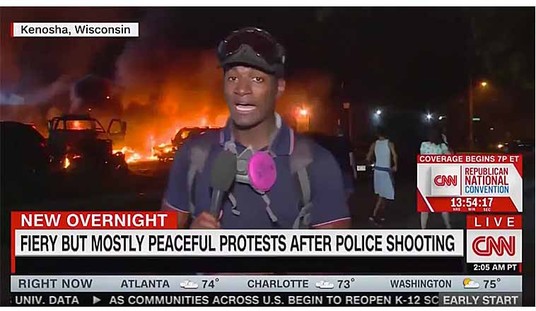You might want to sit down for this one …
It seems that the New York Times is once again in the awkward position of having to explain a gaping hole in of their proudest achievements in recent history:
My interview with NYT Executive Editor Dean Baquet on what went wrong with the hit podcast series "Caliphate": "We wanted to believe."
Listen to him on my piece for NPR's @MorningEdition, then read the full story. https://t.co/ZVxCWz22wY
— David Folkenflik (@davidfolkenflik) December 18, 2020
They wanted to believe … and isn’t that enough?
More from NPR:
Caliphate relayed the tale about the radicalization of a young Canadian who went to Syria, joined the Islamic State and became an executioner for the extremist group before escaping its hold.
Canadian authorities this fall accused the man, Shehroze Chaudhry, of lying about those activities. He currently faces criminal charges in a federal court in Ontario of perpetrating a terrorism hoax.
“We fell in love with the fact that we had gotten a member of ISIS who would describe his life in the caliphate and would describe his crimes,” New York Times executive editor Dean Baquet tells NPR in an interview on Thursday. “I think we were so in love with it that when when we saw evidence that maybe he was a fabulist, when we saw evidence that he was making some of it up, we didn’t listen hard enough.”
They didn’t listen hard enough? Or they heard it loud and clear and decided to ignore it anyway?
The Times did not remove 'Caliphate' from its site or feeds. Asked whether its actions constitute a retraction, Baquet paused and told me, "I guess for the parts that were about Chaudhry and his history and his background. Yeah, I think it is. Sure does."https://t.co/N6YQeARVLL
— David Folkenflik (@davidfolkenflik) December 18, 2020
From the host and star of “Caliphate” – @rcallimachi https://t.co/933NMicaXt
— David Folkenflik (@davidfolkenflik) December 18, 2020
Rukmini Callimachi’s got a lot to be proud of:
An editor's note has been added today to another @nytimes story by @rcallimachi, this one from 2014 https://t.co/VwdRwjHeCV pic.twitter.com/tzAznleVHv
— Katie Robertson (@katie_robertson) December 18, 2020
And to another story, this one from the end of 2019. The Times investigators were looking at a broader range of work than just Caliphate https://t.co/FULAJwCmMs
— Katie Robertson (@katie_robertson) December 18, 2020
Don’t worry. We’re sure there’s still lots more where that came from.
Michael Barbaro, host of the New York Times’ podcast The Daily, also spoke to Dean Baquet about the issue:
My conversation with @deanbaquet and @MarkMazzettiNYT about the findings of an NYT investigation into "Caliphate" and it's central character.
"We’re here," Baquet told me, "to talk about a story that I believe we got wrong."https://t.co/09WOpLXKVM
— Michael Barbaro (@mikiebarb) December 18, 2020
Here's the NYT investigation into the series: https://t.co/pFSqbFh7h1
Here's the NYT's editor's note published this morning: https://t.co/c1fAOpf0Eo
— Michael Barbaro (@mikiebarb) December 18, 2020
Here are the first three paragraphs of the “Editor’s note” (yes, there are more than three paragraphs):
In 2018, The Times released a 12-part narrative podcast series called “Caliphate” on the Islamic State terrorist group and its operations. While parts of the series involved a broad examination of the group’s tactics and influence, multiple episodes were driven primarily by the confessional tale of a Canadian man of Pakistani origin who called himself Abu Huzayfah and claimed to have been a member of the Islamic State who had taken part in killings in Syria.
During the course of reporting for the series, The Times discovered significant falsehoods and other discrepancies in Huzayfah’s story. The Times took a number of steps, including seeking confirmation of details from intelligence officials in the United States, to find independent evidence of Huzayfah’s story. The decision was made to proceed with the project but to include an episode, Chapter 6, devoted to exploring major discrepancies and highlighting the fact-checking process that sought to verify key elements of the narrative.
In September — two and a half years after the podcast was released — the Canadian police arrested Huzayfah, whose real name is Shehroze Chaudhry, and charged him with perpetrating a terrorist hoax. Canadian officials say they believe that Mr. Chaudhry’s account of supposed terrorist activity is completely fabricated. The hoax charge led The Times to investigate what Canadian officials had discovered, and to re-examine Mr. Chaudhry’s account and the earlier efforts to determine its validity. This new examination found a history of misrepresentations by Mr. Chaudhry and no corroboration that he committed the atrocities he described in the “Caliphate” podcast.
Let Barbaro be clear: this is not a retraction.
Contrary to headlines and Tweets from NPR, the NYT has not retracted the "Caliphate" series.
— Michael Barbaro (@mikiebarb) December 18, 2020
Oh no?
What is the appropriate description of this conclusion, from the editor’s note: “The Times has concluded that the episodes of “Caliphate” that presented Mr. Chaudhry’s claims did not meet our standards for accuracy.”
— Eric Umansky (@ericuman) December 18, 2020
That the Times says it cannot stand by the episodes of Caliphate that present his claims. That's not the entire series, by a long shot, and the NYT did not retract the series.
— Michael Barbaro (@mikiebarb) December 18, 2020
Shorter Michael Barbaro:
Would be a shame to have to return those awards. https://t.co/Yo5e45lDBn
— Stephen L. Miller (@redsteeze) December 18, 2020
Bingo.
We get that Barbaro has a vested interest in defending the New York Times’ honor, but dude. Come on.
"Caliphate" was one of the NYT's most important pieces of journalism in the last five years and today we learn the paper can't stand by it. Another huge blow to their credibility
What will we learn about their Trump coverage in 2023?https://t.co/FE0IRuxoHr
— Joe Gabriel Simonson (@SaysSimonson) December 18, 2020
Guess we’ll have to wait until 2023 to find out. Or not.
I doubt we'll ever hear these words about any of their Trump coverage – "I think this is one of those cases where I think we just didn’t listen hard enough to the stuff that challenged the story and to the signs that maybe our story wasn’t as strong as we thought it was.”
— Shannon (@fromtheedgeof7) December 18, 2020
We won’t be holding our breath, just to be safe.
They collected a Peabody award and a Murrow award for it and this will be forgotten by the end of the day today. They’ll be defended by their colleagues because that’s what journalism is now. https://t.co/g8ftMMpfxG
— Stephen L. Miller (@redsteeze) December 18, 2020
Case in point:
What to call the @nytimes action on "Caliphate"? An editor's note says that "The podcast as a whole should not have been produced with Mr. Chaudhry as a central narrative character." Yet @mikiebarb says there's no retraction of the series: https://t.co/R7kcwWBZr7
— ErikWemple (@ErikWemple) December 18, 2020
NPR initially headlined its story "NYT retracts hit podcast series…" but later amended to say "NYT retracts core of hit podcast series…" I contacted NYT PR about whether it considers its action a retraction…
— ErikWemple (@ErikWemple) December 18, 2020
“Amended.”
Contrary to my friend @mikiebarb, Dean Baquet explicitly told NPR that the NYT’s actions constituted a retraction of the core of “Caliphate” – anything that touches on Chaudhry.
Hard to process the series without him. https://t.co/axXxlarnKc https://t.co/02TW78caa8
— David Folkenflik (@davidfolkenflik) December 18, 2020
Our headline initially cited retraction of podcast about Isis executioner – Chaudhry. We tweaked to say core of entire series.
The NYT is still working through what all this means, as Baquet told to me.
May be easier to perceive from outside.
Props to Dean for taking my Qs.
— David Folkenflik (@davidfolkenflik) December 18, 2020
Yeah, props to Dean Baquet. He did a great job here!
…and Danielle Rhoades Ha responded, "Nothing has been unpublished. We've appended an editors' note to address lapses in the series. (Most people see a retraction as unpublishing, which is not the case.)"
— ErikWemple (@ErikWemple) December 18, 2020
My take? Though it didn't use the "R" word, @nytimes has issued a retraction, at least of the episodes poisoned by the fabulism of Abu Huzayfah/Shehroze Chaudhry. Hard to read it any other way. But eager to hear other opinions.
— ErikWemple (@ErikWemple) December 18, 2020
At least Erik Wemple is raising his eyebrows a little bit. But other opinions aren’t worth hearing if they downplay or excuse the New York Times’ massive editorial blunder.
As I was saying.. “hey we amended it. Moving right along.” pic.twitter.com/pQZFY8n6e6
— Stephen L. Miller (@redsteeze) December 18, 2020
Anyone who’s ever tried to get a correction from the NYT knows the whole facade of righteous truth-seeker falls away and they turn into the finest jurists this side of a class action suit. You have flashbacks of grainy videos of Bill Clinton doing the grammar of ‘is’. https://t.co/rP5icP8KcC
— Daniel Foster (@DanFosterType) December 18, 2020
Good analogy.
Meanwhile, an exit idea:
The Times is possibly going to rename it
"The 2018 Project" https://t.co/4Cl4GW6SkR— Jeryl Bier (@JerylBier) December 18, 2020
Editor’s note: This post has been updated with additional text and tweets.























Join the conversation as a VIP Member